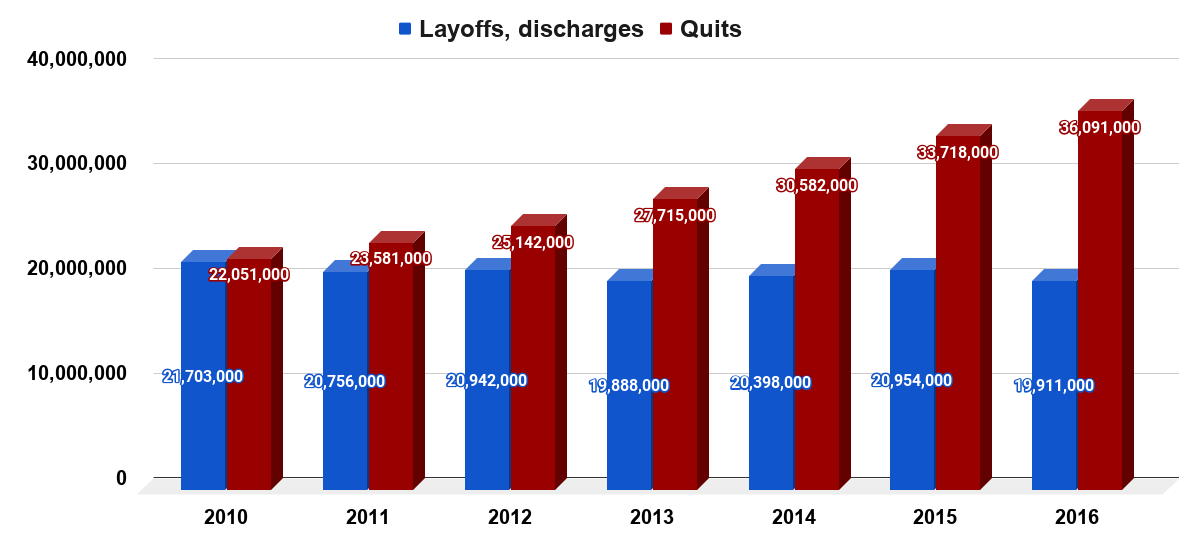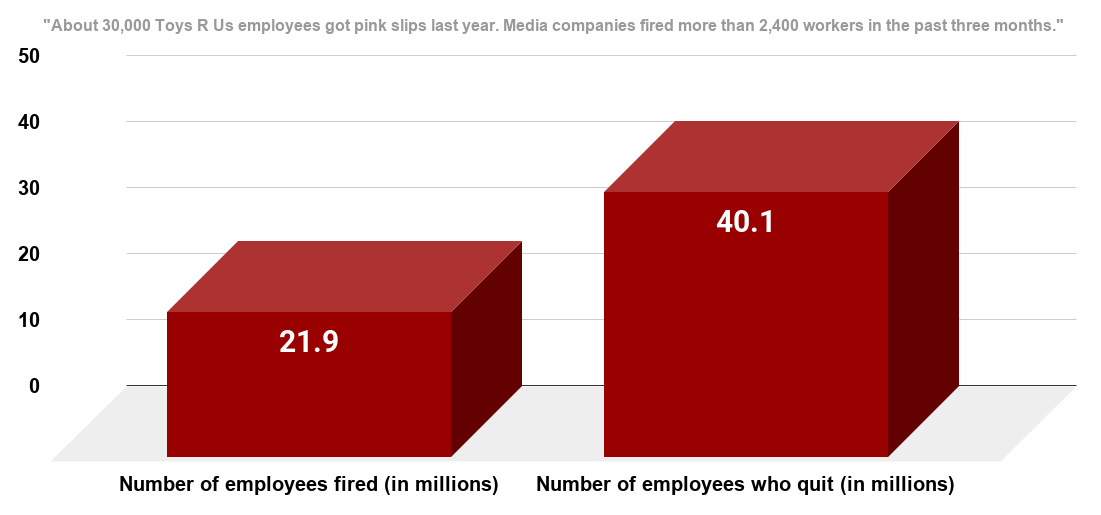Warning Signs Of Getting Fired and What You Should Do
WhatToGetMy Instructional Article
- Some employers will never come out outright to tell you they want to fire you. They will instead resort to scrupulous and underhand tactics and signs they want to fire you.
- Are you constantly worried about getting fired? Worry no more and live in fear no more. Our helpful article puts together the 21 warning signs of getting fired that you should look out for.
- We also offer 6 helpful strategies of what to do if you know you are getting fired.
According to a 2016 report seen on the Bureau of Labour Statistics, more employees quit than those who get laid off or fired. The number stood at 19,911,000 layoffs and fired employees, as against 36,091,000 who quit, in 2016. This trend appears to remain constant even up to 3 years later, according to a 2019 survey seen on Vox. according to the Vox report, 21.9 million employees got fired, compared to 40.1 million who quit.
Annual quits, lay-offs, and discharges in America between 2010 to 2016. Source: Bureau of Labor Statistics

According to a 2019 Vox online report, “American layoffs and firings are at a 20-year low and jobs are more secure today than at any point in modern history.” Source: Vox

These stats are certainly encouraging in showing that the rate at which employees get fired has dropped considerably from previous years, especially when compared with the rate at which they quit. According to the Vox report mentioned earlier, job security in America as of 2019, was in a good place.
As encouraging as all of these are, they however also show one certain thing, and that is the fact that employees get fired from work. And let’s be honest, getting fired from work sucks. And this is mostly because, in most of the cases of employees who were fired, they were blindsided. They never saw it coming. And when you don’t see a firing coming, it spells doom for you because it means you would be out of a job without any plan B in place to protect you financially.
It was bad enough going through an excruciating interview where you weren’t sure you got the job. And now after getting the job, to be blindsided to losing it by getting fired. We don’t want that being your fate. And that is why we have put this article together for you. Let us help you prepare in advance, rather than being constantly worried about getting fired. This article will let you in on how to know if you are getting fired, by showing you the 21 warning signs your boss wants to fire you or is going to fire you. We also offer helpful insights on what to do if you know you are getting fired.
How to tell if your boss is going to fire you – 21 warning signs you are going to be fired.
Sometimes, employers resort to scrupulous means to finally give an employee they no longer want the pink slip. First, they will start by giving you some subtle or not so subtle hints that they want you to fire yourself or leave. And if you don’t know what these signs are/might be, our helpful article on 37 Telling Signs your boss wants you to either leave or stay can help you out.
When this doesn’t work, they resort to making it even clearer by giving you these 21 warning signs you are going to get fired. If you see more than half of these 21 warning signs, then the handwriting on the wall may be clearer than you want to admit.
Don’t be caught unawares and unprepared. Keep your eyes open for any or all of these signs, so that you can start taking the 6 strategies we suggest in the next section.
1. You’re kept in the dark about information that everyone knows about.
When you notice that all of a sudden company information of whatever nature is being kept away from you while every other employee knows about it, that is a very telling sign that they are preparing to fire you. When an employer does this, they are treating you like an outsider and making a statement that you are no longer seen as a part of the company. Don’t take this lightly especially if it happens more than once.
2. They’ve stopped training you.
Employers spend their resources training employees they consider valuable and important to the company. If you’ve requested for an important training which will equip you to do your work better, and they refused your request and yet granted it for another employee in your department, you should be on guard.
3. Your subordinates are suddenly treated better in a way that undermines your authority.
Your employer may do this by bypassing you and going straight to your subordinates in instances where they should ordinarily go through you. By undercutting you, they are subtly preparing for your exit from the company.
Not only does this undermine your authority with your subordinates, but it also tells them that the relationship you have with the bosses is strained and may be on the verge of collapse.
4. You get less and less meaningful work and more mundane work.
This is also one of the signs an employer gives you when they want you to quit. If you are still not getting the message and giving them what they want, they will turn it up a notch and swamp you with paperwork that bears little to no relevance to the real work you’re supposed to be doing.
5. You are suddenly left out of important projects when that has not always been the case.
Maybe before you were always the go-to person when an important project came to your department. Suddenly, however, all that has changed. You are now deliberately left out of key and important projects and there is no warning or explanation for this. The company is already preparing for life after you have been shown the door, even before you have been shown the door.
It’s never a good thing when an employer suddenly starts keeping you out of important projects without giving you a heads up or advance notice and showing you any alternative arrangements or other more challenging projects they want you to focus on.
6. The attitude of everyone else towards you at work changes, and not in a good way.
Maybe you’ve always had fun hangouts with your coworkers after work, or your coworkers always enjoyed hanging out with you at the office, but all of that has suddenly changed. All of a sudden, it feels like you’re being treated like a skunk or outsider.
In some instances, you may even notice colleagues giving you a certain type of look or stare when you walk into the vicinity. They may start speaking in hushed tones when you’re around. Something just suddenly seems off when you’re around your coworkers.
All of these are no coincidence and you are not imagining it. When an employee falls out of favor and is about to be fired, other employees usually get to know before them. And what then happens is that these other employees start to distance themselves from the employee who is about to be fired because they do not want to be termed as being guilty by association.
If your relationship and general interaction with your colleagues was great before, and it’s suddenly gone south and you feel like you’re treated like an outcast by them, be on guard. It is almost always an indication that you’re going to be fired.
7. You either suddenly become very micromanaged or very ignored.
Pay attention to this sign especially if you’ve always been allowed free rein and was never micromanaged. If your boss has always been a micromanager then it is nothing to be worried about because it is his/her way of doing things.
On the flip side of that coin is being ignored entirely. Maybe you used to have review meetings with your boss on a weekly or monthly basis, but suddenly even that has become too much to ask for. Suddenly your manager is “too busy” for you and you can’t seem to ever get a meeting with them. You are not imagining that he/she is avoiding you. They are avoiding you and are doing so because they know they want to fire you.
8. Someone new gets hired almost immediately and you are asked to train the person.
Companies hire people all the time so this shouldn’t be a problem, right? Well, it wouldn’t be if they are hiring someone else in another department that has nothing to do with yours, and if the new hire doesn’t look like they’re already doing your job. And as if it couldn’t get worse, you are then asked to train the new hire and teach him/her all that you know about your job.
Be on high alert when you see this happen, and start making necessary arrangements on time before it’s too late.
9. Your company starts saying it is having financial challenges.
When a company starts to experience financial difficulties, it will resort to cutting down staff as a way of reducing its costs to stay afloat.
Always keep your eyes and ears on the ground about your company’s financial standing. Pay attention to departments that are deemed performing and nonperforming departments. Non-performing departments are usually the first to be axed when a company needs to reduce staff complement to stay afloat.
Knowing where your company stands financially and how departments are classed will help you know when to start making necessary arrangements when the handwriting on the wall becomes clear.
10. Your company is amid a merger or acquisition.
Mergers and/or acquisitions are another corporate occurrence that affects employee jobs. Existing employee jobs are never guaranteed during a merger and/or acquisition because the merging/acquiring corporation will always have its plans and employees which it would bring on board.
To avoid being caught unawares, once you get wind of a merger and/or acquisition of your company, it’s time to start looking elsewhere and making contingency plans. This is so that it is not too late assuming you get shown the door unexpectedly.
11. You’ve been put on a performance improvement program.
A Performance Improvement Plan (“PIP”) is a coded way of an employer telling you that you are not performing at the expected level. It is not always the case that if you are placed on a PIP you are about to be fired. In some companies, they genuinely want to upscale their employees, and their PIPs are the way they do it. For others, putting you on a PIP is a prequel to getting fired.
How do you know which is which? If you get put on a PIP, find out from others in your workplace what the significance of being placed on a PIP is. This helps you to know what eventuality you should be preparing for.
12. You’ve been demoted or had a cut made to your salary.
A demotion is of course wrong, but this does not stop an employer who wants to fire you from doing it. They may not outrightly demote you but take steps that show you have effectively been demoted. They may relegate you to doing tasks that are in a department below your department.
On the other side, they may make inroads into your salary in a negative way. Or they could give you more work and not increase your salary.
Making a negative inroad into your salary should not be a cause for concern if the company is going through financial difficulties and a salary reduction is their less drastic option to letting employees go. If however, this is not the case, then you should be worried.
13. You start hearing things such as “your attitude isn’t working for this company anymore” or “you are no longer a good fit”.
Such statements are the employer’s way of telling you that your journey with them is about to come to an end. If you start to hear comments like this being dropped now and again, don’t wait until it’s too late. This is because when an employer feels this way, chances are that feeling will not change, and it is only a matter of time before they fire you.
14. Perks and benefits stop coming your way or the ones you already have started disappearing slowly.
Maybe you used to get a bonus at the end of every year or every quarter, and suddenly it was stopped. And not only was it stopped, but they also started taking away the ones you already have slowly. No explanation is given for this, and you seem to be the only employee that this is happening to. If all of these explain the situation with your perks and benefits at work, you should be concerned because it is most likely a prequel to getting fired.
15. Your efforts at the office are no longer recognized or appreciated.
Of course, you don’t need to get a pat on the back for every small thing you do in the office. But significant contributions have always been appreciated and recognized. If this suddenly stops, the employer is hoping to downplay your contribution, to make it easy to show you the door.
16. Sudden restrictions are placed on the things you have access to, especially information.
Does it feel like your access codes have changed and you now need to go through a million protocols to have access to the information? And yet, this was not always the case? It is no accident. That’s the employer’s way of telling you that you are no longer trusted or wanted and that it may fire you sooner rather than later.
17. Your relationship with the boss changes and it’s not for the better.
This is different if you had a bad boss or manager from the get-go. If however your boss or manager was always good to you and you had a friendly and cordial rapport with them and that changes suddenly, it is worth paying attention to.
Creating friction is their way of distancing from you psychologically before the actual physical separation that comes when they fire you.
And if you have a bad manager, let our article on What to do when you have a bad manager help you with practical ways to deal with your bad manager.
18. Everything you do suddenly starts getting scrutinized under a microscope and big deals are made out of things that would be considered small things before.
In some really bad cases, even something as minor as forgetting to put a comma in the right place could get you a tongue-lashing on the importance of commas. And yet, small things like those were never blown out of proportion. To worsen matters, you may even notice that a colleague committed a bigger screwup and nothing much is said of it. This is a subtle way of telling you that you have fallen out of favor and may be booted soon enough.
19. A sudden upsurge in the rise of emails documenting your faults and copying HR or any other management staff in such emails.
An employer starts doing this when they want to create evidence to support their dismissal. Once you notice this, ensure that you reply to such emails professionally and with adequate evidence defending yourself. Also, keep these email trails handy. Print them off as soon as possible if you can to cater for when you are suddenly shut out of your email or denied access to them.
20. You’ve been asked if you’ve ever considered outside opportunities indirectly.
If you start getting questions like this, you should be worried. They may make it as vague as asking you “So, where do you see yourself professionally in a year (or 2, 5 years) time?” Note how they are not asking you where you see yourself in the company. And this is because they don’t see you in the company and are hoping you pick up on that subtle difference in wording and get the idea that you are wanted out.
21. Your boss has threatened to fire you although it may have sounded like he/she wasn’t too serious.
A boss who doesn’t want to fire you won’t threaten to fire you every time you do something wrong. But if it has become a norm that every time you have a run-in with the boss, he/she resorts to saying things like “if you’re not careful, I will fire you”, beware. He/she is not just saying it. They mean it and will do it once they feel the time is right for them.
What to do if you know you are getting fired – 6 helpful strategies.
Knowing what the signs you are going to be fired are, isn’t enough. You also need to make concrete plans and have a solid strategy to ensure you are not out in the cold with nothing to fall back on. Take the following 6 strategic actions.
1. Decide if you want to stay on or leave voluntarily.
This is where it starts. Maybe you already were contemplating leaving anyway because you wither don’t enjoy the work very much any longer or for whatever other reason. Or maybe you do love your job and want to stay a little longer, and not yet ready to leave.
Whatever the case, you need to ask yourself what it is you want once you start seeing these signs. This will help you decide on which of the courses listed below you want to adopt.
If you’re in two minds about staying or leaving, perhaps our article on When to quit your job immediately can help you with making up your mind.
2. If you decide you want to stay, have a conversation with your boss.
If staying is the option you decide to settle for, it is time to have a difficult conversation with your boss. Politely and calmly bring your observations and concerns to his/her attention and ask if there is anything you need to be doing differently.
3. But put in place a contingency plan immediately like looking for other jobs.
This is important because you need to be prepared for the possibility that your boss’s mind may be made up to fire you and no amount of conversation would change their mind. Once you’ve had the conversation with him/her and nothing improves, it is time to dust your resume and start looking for other opportunities.
Be sure however that you don’t carry out your job searches at the office during work hours or on the work computer or wifi network. This is because these can easily be monitored by your employer and you don’t want them getting wind of your plan even before you’ve started on it.
4. While working on your contingency plan, up your game at work to remind them of your value and contribution.
Even if your boss has made it clear that you will be fired no matter what, it does not mean you should slack off work. Act like the superior and efficient professional that you are, and make your last days count by leaving an indelible mark of your value and contribution to the company. And who knows, maybe it would make your boss reconsider.
And even if it doesn’t have that effect, you can leave with your head held high that you left on a high note. It would also protect your professional reputation which is very important in the next job you will be taking on.
5. If you decide you want to leave, plan a solid well thought out exit strategy and it shouldn’t be too long.
Have a solid 3 – 6 month exit plan/strategy before you leave. In our article on When to quit your job immediately, we help you with helpful tips on what a good exit strategy for when you decide to quit your job looks like.
6. Serve notice and make a clean break.
Give the customary 2-week notice period once your exit strategy/plan is complete and make a clean break. Help with a proper handover and tie up all loose ends. And finally, don’t forget to have fun with your coworkers for the last time before your last day of work. If you’re looking for ideas on how you can do so, read our article on Funny things to do on your last day of work for cool fun ideas.
Frequently asked questions.
What to do when someone is trying to get you fired?
If you notice that someone at work is trying to get you fired, be on extra alert in your interactions with them. Ensure that everything about your interaction with them is well documented. Be a step ahead of them and cover every base they would want to exploit to get you fired. If you have a trusted colleague confide in them about your concerns and seek their views and assistance with helping you watch your back where that person is concerned.
If I am constantly worried about getting fired, is that a good thing or a bad thing?
It’s never a good thing if you’re constantly worried about getting fired. You being constantly worried is an indication that you may be on the red list for being fired.
Rather than losing your sleep and driving yourself insane with worry, look out for any or all of the 21 warning signs of getting fired listed in this article. If you don’t notice or see any of them, then you have nothing to worry about.
But, if you see some or all of them, then it’s time to gear up into action rather than waste time with worry. Take the 6 strategic steps listed in this article and safeguard your interests.
How do I know if I’m getting fired?
You will notice some or all of the 21 warning signs you are going to be fired listed in this article.
In conclusion.
Don’t fall prey to being blindsided by an employer who fires you unceremoniously. Safeguard yourself by paying attention to all nor some of the 21 warning signs of getting fired listed in this article.
Once you have these signs, be proactive and take the 6 strategic steps listed in this article to ensure you do what is best for you and your professional career.
01 HOUR 28 MINUTES
ESTIMATED TIME DESIGNING AND UPLOADING THIS ARTICLE
07 HOURS 28 MINUTES
ESTIMATED TIME RESEARCHING AND WRITING THIS ARTICLE
You Might Also Like


